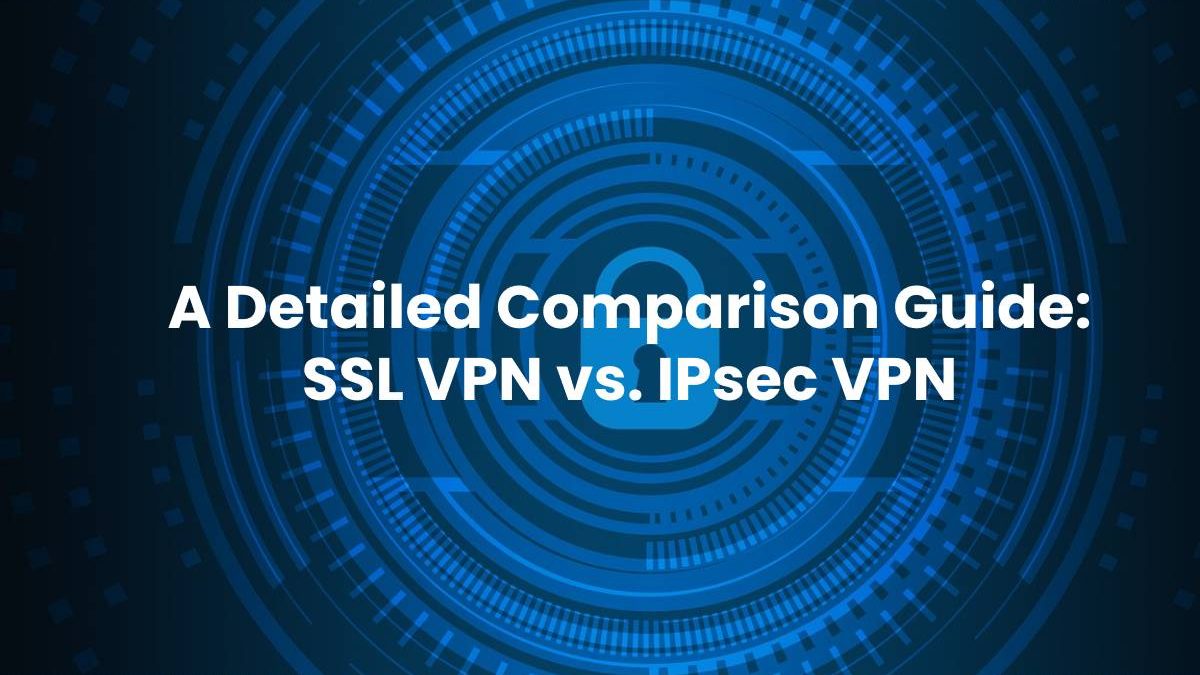There is a rising interest in reliable and secure virtual private network products as additional users request remote access to big business network frameworks, programming, applications, and different assets. By empowering solid encryption to safeguard information and strong authentication to limit admittance to applications as per laid out security strategies, the right VPN can assist an organization with lessening the security chances related to giving far-off network access.
The decision between an SSL VPN and an IPsec VPN is among the most crucial when choosing a VPN. When comparing IPsec vs. SSL VPNs, businesses must assess the respective benefits of network performance, maintenance, and configuration in addition to the various security threats associated with each type of network connection encryption.
Table of Contents
What is SSL VPN?
Like an IPsec VPN, an SSL VPN (secure sockets layer) operates over the Internet. Instead of requiring the client computer to be installed with an actual application, it typically runs through the web browser (among other application layer protocols). This makes managing it much simpler. Most contemporary computers come pre-installed with one or more web browsers that support SSL. In front of a perimeter firewall that must be set up to allow traffic to the gateway, SSL/TLS VPN gateways are installed.
Most modern web browsers typically come with SSL, which is used to control communication between the client and the VPN server. Because SSL VPNs can tunnel solely to web-enabled apps rather than the entire network, they are sometimes safer than other types of VPNs. Since the user can only access applications that are exposed to them, their permissions may be regulated with greater precision.
Deploying and managing a premium VPN can be expensive. However, you can use VPN for free to protect your online privacy and security.
What is IPsec VPN?
The conventional VPN approach uses Internet Protocol Security (IPsec). It was first used in the 1990s and is still widely used today. It is well established. IPsec is not implemented through the web browser; instead, it requires third-party client software on the user’s device to access the VPN. Client software is something that businesses need to buy, install on each user’s computer, keep updated, and occasionally pay to keep their license. This makes configuring and implementing IPsec fairly difficult.
Comparing the Major Differences: SSL VPN vs. IPsec VPN
Identifying the needs of the company and its users and choosing the VPN’s most crucial features and functionalities is the first step in comparing IPsec vs. SSL VPNs. The following are some of the distinctions between IPsec and SSL VPNs:
1. Connectivity
The fact that SSL connects users to certain programs and services whereas IPsec links distant hosts to entire networks and supports all IP-based programs is one of the major distinctions between the VPN protocols.
Things are retrieved at the network layer considerably more quickly with IPsec since it is faster and is designed for speedy access to VoIP and streaming media. Users won’t be able to access centralized storage or printers on the network with SSL.
2. Security
If securing the highest level of data security is your top priority, IPsec is the way to go. Because IPSec has built-in authentication, it is ideal for maintaining data integrity. IPsec VPNs also have powerful anti-replay features and the choice of various encryption levels.
SSL depends on third parties for integrations because it lacks built-in authentication. SSL can only employ a single DES (128-bit key), which is insufficient for most applications, while IPsec can use the more robust AES standard.
3. Performance
The encryption employed by IPsec and SSL VPNs typically has no performance impact on modern hardware, but enterprises should test VPN candidates using benchmarks. SSL VPNs, which work through web browsers, can establish connections much more quickly. IPsec VPNs configure a tunnel between client and server using software on the client, which may require a relatively time-consuming setup process.
4. Client Security
Although the IPsec protocol is a part of the TCP/IP suite, OSes that support TCP/IP do not always include it by default. On the other hand, SSL VPNs rely on several different application layer protocols, including TLS, which is built into web browsers by default. Thus, while contrasting IPsec and SSL VPNs, it is important to take into account both the security of each choice as well as how users connect to and utilize the VPN. Implementers should take into account the VPN user profiles, the attack surface of clients with VPN support, and client connection methods.
5. Management
Solutions for IPsec VPNs are typically simpler to configure and maintain. Users simply need to turn on the VPN clients to receive safe access; all else on the client-side, including VPN software installation, is automatic.
SSL is an exception to this rule. Client computers are connected using SSL connections to particular programs rather than the entire network, necessitating routine settings to guarantee each has the required access.
Conclusion
The endpoints for each protocol are the primary distinction between IPsec and SSL VPNs. SSL VPNs provide users with remote tunneling access to a single system or application on the network, but IPsec VPNs provide remote connections to the entire network and all its applications. The best application to employ depends on finding the correct balance between end-user convenience and organizational security.

